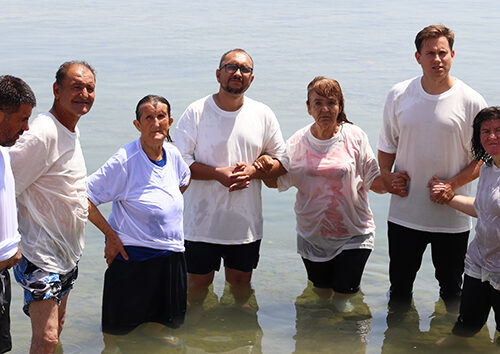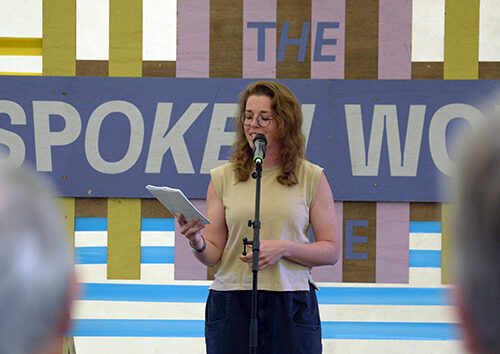13 February 2017 | Binfield, UK [Helen Pearson] Give a lecture a thought provoking title and you will capture an audience. That was certainly true on Tuesday, 7 February as a capacity audience actually overflowed into the corridor for Newbold’s first Diversity Lecture for 2017, ‘Moving beyond Immature Faith – a psychiatrist’s perspective’.
 Torben Bergland, a psychiatrist, psychotherapist and medical doctor, attracted both a large audience and stimulated much discussion with his summary of significant issues in the difficult conversation between psychology and religion during the last 100 years.
Torben Bergland, a psychiatrist, psychotherapist and medical doctor, attracted both a large audience and stimulated much discussion with his summary of significant issues in the difficult conversation between psychology and religion during the last 100 years.
Dr Bergland, Health Director for the Trans-European Division of Seventh-day Adventists, began with an overview of the ideas of Freud who depicted faith in a heavenly Father God as a “blissful hallucinatory confusion” adopted by those unable to face the challenges of adult experience. Freud suggested that the 11th commandment of religion is, ‘Thou shalt not question’. Dr Bergland went on to look at different pictures of faith. The American philosopher William James suggested that true religion is a human response to a personal recognition that ‘there is something wrong with us as we stand’ from which we are saved by connection with a higher power giving us ‘an assurance of safety and a temper of peace’.
 The German social psychologist, Erich Fromm, suggested that authoritarian religion was based upon a paralysing human surrender to an omnipotent, omniscient God. He differentiated it from humanistic religion centred around a response to a more humanistic divinity interested in maximum human development. Dr Bergland suggested that, in his experience, the former, more immature religion develops a love of God based on human need, the latter is more likely to be motivated by love and admiration for God.
The German social psychologist, Erich Fromm, suggested that authoritarian religion was based upon a paralysing human surrender to an omnipotent, omniscient God. He differentiated it from humanistic religion centred around a response to a more humanistic divinity interested in maximum human development. Dr Bergland suggested that, in his experience, the former, more immature religion develops a love of God based on human need, the latter is more likely to be motivated by love and admiration for God.
 American psychologist Gordon Allport examined religion with an extrinsic, utilitarian orientation which asks the question, ‘What’s in it for me?’ Religion with a more intrinsic orientation is more generally reflective and develops an integrated faith as a considered response to the whole of life. A great deal of research, it seems, shows that ‘extrinsic religion correlates with more dysfunctional psychological constructs.’
American psychologist Gordon Allport examined religion with an extrinsic, utilitarian orientation which asks the question, ‘What’s in it for me?’ Religion with a more intrinsic orientation is more generally reflective and develops an integrated faith as a considered response to the whole of life. A great deal of research, it seems, shows that ‘extrinsic religion correlates with more dysfunctional psychological constructs.’
Dr Bergland paid extended attention to James Fowler’s religious types and described the different religiosities of native American religions, some based on fear, some on love. He described how William Meissner looked at open religious systems which are friendly to the world and hospitable to egalitarian relationships and closed systems based on unquestioned authority and response to perceived threat.
 Finally, Dr Bergland looked at personal experience of God. “Religion is not just about teaching,” he said, “it is very much linked to our personal history. The two most important questions are, ‘Who is your God’ and ‘Who are you?’ We become who we believe we are.” He showed how levels of security, anxiety, fear and avoidance in human attachments are echoed in similar relationships with God. He observed that most people have a positive image of Jesus, but many people struggle to transfer that image on to their picture of God.
Finally, Dr Bergland looked at personal experience of God. “Religion is not just about teaching,” he said, “it is very much linked to our personal history. The two most important questions are, ‘Who is your God’ and ‘Who are you?’ We become who we believe we are.” He showed how levels of security, anxiety, fear and avoidance in human attachments are echoed in similar relationships with God. He observed that most people have a positive image of Jesus, but many people struggle to transfer that image on to their picture of God.
 In conclusion, Dr Bergland shared his own definition of mature faith. “It is a true understanding of God in whose image human beings are made. The fruits of that faith are what the Apostle Paul listed: ‘love, joy, peace, forbearance, kindness, goodness, faithfulness, gentleness and self-control.’”
In conclusion, Dr Bergland shared his own definition of mature faith. “It is a true understanding of God in whose image human beings are made. The fruits of that faith are what the Apostle Paul listed: ‘love, joy, peace, forbearance, kindness, goodness, faithfulness, gentleness and self-control.’”
 In the 45-minute question and answer session, the 70-strong audience, one of the largest ever for a Diversity Lecture, responded with an inter-generational, multi-cultural, and religiously diverse discussion of the nature of faith, continuing long after the formal lecture finished! [tedNEWS]
In the 45-minute question and answer session, the 70-strong audience, one of the largest ever for a Diversity Lecture, responded with an inter-generational, multi-cultural, and religiously diverse discussion of the nature of faith, continuing long after the formal lecture finished! [tedNEWS]
https://www.youtube.com/watch?v=aYTNj_qJbug&feature=youtu.be
tedNEWS Staff: Victor Hulbert, editor; Esti Pujic, associate editor
119 St Peter’s Street, St Albans, Herts, AL1 3EY, England
E-mail: [email protected]
Website: www.ted.adventist.org
tedNEWS is an information bulletin issued by the communication department of the Seventh-day Adventist Church in the Trans-European Division.



